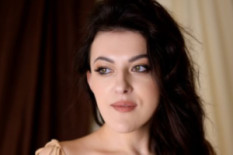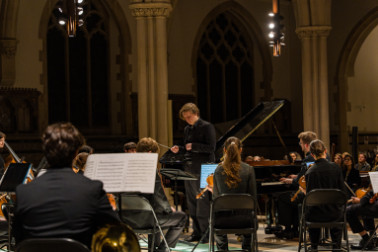It was created by three Swiss citizens - Natalia Sheremet, Olha Bonvin, and Mari Zimmermann, who live and work in the canton of Valais. The war in Ukraine is a personal story for each of the co-organizers. Mari is the mother of two Ukrainian children whom she and her husband adopted in the early 2000s, and thus Ukraine is the homeland of her daughter and son, making it a close and important country. Natalia, of Ukrainian descent, has lived in Switzerland for 20 years but still considers herself Ukrainian. Olha, living in Sion, has many Ukrainian acquaintances and, as she emphasizes, a lot of Ukrainian awareness. Their involvement in the topic of Ukraine helped them quickly engage in work while people and states were recovering from shock and confusion.
From this emotional and sincere interview with the three organizers of Destination Ukraine, you will learn about their motivations, inner experiences, and the association's primary mission, goals, and activity directions.
Olha Bonvin, Natalya Sheremet, Marie Zimmermann
How did your volunteer work begin?
Mari: In the first days of the war, the mayor of the city of Sion contacted me and asked if I wanted to do something related to the events in Ukraine, like creating an association for Ukrainians who were already coming to Switzerland very quickly and in large numbers at that time. I accepted the proposal. It was March 7th. Before that, on March 3rd, I participated in a peace march where I met Ukrainian, Russian, and Polish women who wanted to do something. I exchanged contacts with them, and one of them was Olha's phone number. After I called her, we immediately started taking action. At that time, I also helped create the first association, which we left after a few months because we had different views on humanitarian aid. Since then, we have worked a lot and been fully immersed in the work, and as a result, we were able to establish the association only a year later, in March 2023.
Olha: As for me, before the start of this war, I wasn't involved in helping Ukrainians at all, although I often engaged in volunteer work in collaboration with the Red Cross. But when everything started, immediate action was needed. I had many Ukrainian acquaintances in Sion, and they immediately began organizing something together, wanting to help their relatives and friends in Ukraine. So I was able to join right away. At that stage, I met Natalia, a Pole who organized an extensive collection of items to send to Ukraine. Everything started for me with this collection because when I saw how everything was working, I realized I could offer something better, help with organization.'
Then, in February 2022, I joined the organization collecting necessary items through social media and nearby supermarkets. As a result, within a few days, we could gather hundreds of boxes of aid and arrange for their transportation to the Polish border to assist the refugees arriving there in large numbers.
After the peace march on March 3rd, where I met Mari and got to know her, we created a WhatsApp channel, which instantly became large and active. Together with Mari, we started looking for a place to store everything we collected. As a result, we opened a distribution center in Botz on March 12th! Later, we established cooperation with supermarkets that provided free delivery of food products to our center for ten weeks.
That's roughly how everything started.

Natalia: When the war started, I immediately went to Ukraine to bring my family to Switzerland. Besides my own family, I asked everyone I could if they needed help. These were very different people: friends, neighbors, acquaintances, and even those with whom we had little interaction. I remember that I couldn't sleep at all in the early days because it was impossible. Someone was always on the road, in danger, and the phone never stopped ringing for a minute. Now, after so much time, I don't even remember how I "got into the battle"; it just happened. I simply tried to do everything possible at that time and everything they asked for, from accommodation to purchasing items that I had no idea about.
As for our collaboration with Mari and Olha, I tried working with different people for a while. But I quickly realized that fruitful work is only possible with those who truly understand and act like you. In our case, it was fast and precise. We came together through our values and working style, so we started collaborating. At first, it was on specific tasks, and then it became permanent.

With the start of the war, the pace of life increased exponentially. We had to be everywhere and capable of everything - finding carriers, negotiating with medical control services because they wouldn't allow us to touch certain medications. We took action because it was crucial, and couldn't do otherwise.
In the first few weeks, a surgeon contacted Olha. He had a private plane, experience in humanitarian flights, and was willing to help, at least with transportation. He was immensely helpful to us, including providing medications. We even made several deliveries through him. However, we realized that ground humanitarian convoys were more justified. They took place regularly. At first, we organized them independently, then joined forces with others. It was a powerful feeling as if we were communicating on a different level where everyone was united and anything was possible.


After a year of joint volunteer work, you established the association Destination Ukraine. What was the need?
Mari: Simply put, we realized it was time to do it, at least to be officially recognized and structured. Of course, we had understood that an association was necessary because it makes finding funding, venues, and facilities easier. But throughout that year, we were actively working and didn't have time to create it. We already had space and worked actively, but the association provided a name and official status.
What is the association currently focusing on?
Natalia: The main goal of Destination Ukraine is to extend a helping hand to those who remain in Ukraine and help those temporarily in Switzerland integrate and enable them to assist their homeland even from afar. While maintaining our medical direction as the primary focus, we are currently raising funds, seeking where to purchase the necessary medications, and sending them directly to the country at war, to hospitals and doctors. This is of utmost importance to us. We collaborate with doctors here and in Ukraine, those we fully trust.
Mari: There is a lot of work in this direction... In a country at war, there is often a lack of proper medical treatment. Choosing a primary goal will allow us to focus even more, work in an organized manner, and differentiate ourselves from other associations. We feel genuinely useful in medical projects and respond directly to actual needs.
Natalia: We concentrate on purchasing essential medications for which we receive requests from medical institutions, and we do everything to deliver them quickly to patients. We are also working on more extensive medical projects, but it's too early to announce them.
.jpg)

But apart from medical projects, you have many other initiatives. Tell us about them.
Olha: We have a website where you can read about our projects and goals. But to summarize:
First and foremost, we provide medical assistance to hospitals and doctors in Ukraine.
Secondly, we provide material aid to the population in Ukraine and refugees in Switzerland. For this, we have a facility with a warehouse. We sort through items to send to Ukraine, and refugees also come there to select what they need: clothing, household items, baby strollers, utensils, furniture, and more.
Mari: Thirdly, we aim to help Ukrainians integrate into Switzerland. Here, I see two directions. One is integration through volunteer work. Ukrainians come to participate in our production workshops and markets, where local Ukrainian women prepare and sell Ukrainian delicacies, and they sing in a choir. This helps them integrate into society and raise some funds for the association. The second is assisting refugees in professional integration. In particular, we want to facilitate direct access to the business world for Ukrainians through intensive French or German courses. By the way, Ukrainians can attend our conversational French classes to practice outside the courses and schools they already attend. Integration is our third important goal.
Natalia: We must also explain to Ukrainians how things work in Switzerland. For example, in social services. We constantly provide answers to questions about work, education, training, and more. Currently, we are working to make this part more structured. We already have a plan on how to implement it.
In particular, we created the Telegram channel Destination Ukraine, where anyone interested can ask their questions in one of the sections. This will help us compile a comprehensive list of questions and organize informational events based on specific requests. This way, people can receive clear and detailed answers. In this direction, we closely collaborate with cantonal services.
Olha: We also created and managed social media pages on Instagram, Facebook. As mentioned earlier, we have a website where we strive to provide useful information and continue expanding our knowledge base.
The association is a significant work requiring much attention and time. Where do you find the strength and motivation for this activity?
Olha: I think it has become a way of life for me. At some point, I realized that I couldn't stop. Everyone calls for me, and everyone needs me. And I know how to do it, so I do it. Luckily, I have a family, Mari, and friends who tell me to stop, and that I need to rest. And then I take a little break. But this super important and massive activity has suddenly taken over my entire life.
Mari: That's true. Olha is the president of the association. She is 200% dedicated to the project.
Natalia: I understand what Olha said about being unable to separate oneself from work. Since March 2022, my independent professional activity has taken a back seat to volunteer because it completely consumed me.
And as for where we find the strength and how we manage everything. You simply understand that there is no other option. You take action and do it. You know, sometimes I forget important things. I have to handle multiple tasks at once, approach them from all sides, sometimes because it's urgent, sometimes because the situation is unusual for everyone, and we are setting precedents. And it's challenging at times. Currently, I'm also trying to improve the situation at work. I don't know where to find so much time, but I'll manage.
Mari: Yes, I wanted to emphasize that my colleagues are engaged in independent professional activities. When they stopped working, they no longer had any income. Olha, in particular, did not work for six months and lived off her savings.
Olha: Yes, until the issue of being unable to pay the rent arose. Then I had to return to work to have an income. However, I don't give up volunteering and the association because it's my life.
Mari: As for me, I'm fortunate that my husband provides for us. So, I took an early retirement from my consulting job, allowing me to volunteer. It's my way of life at the moment. Natalia and Olha must work because they need income to pay bills and meet their needs. It's important to understand that.
Engaging in such activities probably involves acquiring new skills and knowledge that are beneficial professionally and emotional fulfillment that also motivates. Please tell us more about that.
Mari: We have different skills and life experiences but complement each other well. I think that's our strength and what motivates us. But most importantly, we just want to help because we feel this situation is horribly unjust. Let me express my personal perspective. I feel that the three of us want to do something to feel less powerless, to tell ourselves that we are doing something. And even if it's just a tiny drop in the ocean, it still matters. It inspires us when we see all these little drops, such as helping people find housing, jobs or learn the French language.
Natalia: When you watch the news, experience all these emotions, and see the horror that is happening to Ukrainians, that in itself is a very powerful motivation to take action. That's what motivates me the most. And also the calls from families who are here. I understand that I can do something, and I do it.
As for emotional fulfillment... it's also present, I suppose. But more often, those emotions are something we have to work with separately.
Right now, I'm moving forward. I'm trying to become more organized, at least as much as possible. And I realized I previously understood "a lot of work" differently.
Olha: As for skills, over this year, I've learned a lot, including delegates. Because I was used to doing everything myself, and now, especially since the association's creation, I learn daily how to be a leader, manage, communicate, and be more confident in myself.
Mari: What I'm currently doing is what I used to do professionally, more precisely, part of the work of a non-profit organization consultant (creating networks for partnerships, finding premises, funding, equipment, volunteers, etc.). Conducting research, caring for volunteers, creating associations - all my job. With Destination Ukraine, I simply utilize what I learned in my professional life and apply it to a cause that is very important and touching for me. But, as I've mentioned before, I must understand that we can do something concrete and beneficial for Ukrainians where they need it the most.
Olha and Natalia have an entrepreneurial spirit, youth, connections with Ukrainians, and the energy for effectively implementing direct actions. And it's truly the complementarity among us that allows us to work well together. This is a valuable experience for me.
Photo - Kyrylo Kоzlenko







